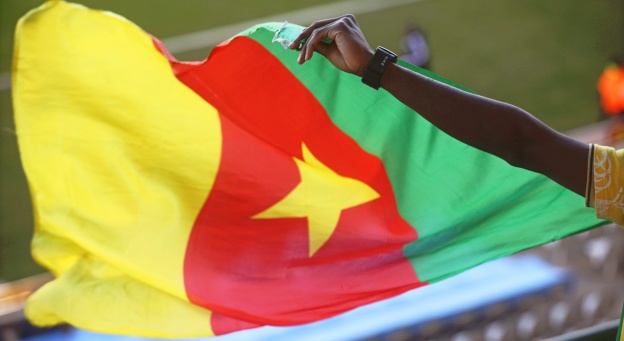 Fitch Ratings-Paris/London-06 June 2014: Fitch Ratings has affirmed Cameroon's Long-term foreign and local currency Issuer Default Ratings (IDR) at 'B'. The Outlooks are Stable. The Short-term foreign currency IDR has been affirmed at 'B'. Fitch has also affirmed the Country Ceiling for Cameroon at 'BBB-', in line with the Country Ceiling for Communaute Economique et Monetaire d'Afrique Centrale (CEMAC) and for the Union Economique et Monetaire Ouest-Africaine (UEMOA) at 'BBB-'.
Fitch Ratings-Paris/London-06 June 2014: Fitch Ratings has affirmed Cameroon's Long-term foreign and local currency Issuer Default Ratings (IDR) at 'B'. The Outlooks are Stable. The Short-term foreign currency IDR has been affirmed at 'B'. Fitch has also affirmed the Country Ceiling for Cameroon at 'BBB-', in line with the Country Ceiling for Communaute Economique et Monetaire d'Afrique Centrale (CEMAC) and for the Union Economique et Monetaire Ouest-Africaine (UEMOA) at 'BBB-'.
KEY RATING DRIVERS
The affirmation of Cameroon's sovereign ratings reflects the following key rating drivers:
The economy is growing at a faster rate than expected six months ago. According to Fitch's estimates, real GDP growth increased to 5.5% in 2013, versus 4.6% in 2012, and the economy should continue to grow at this pace in 2014. Growth is fuelled by the increase in oil and gas output, and by the construction of large infrastructure projects. The additional energy supply generated by the new Kribi power plant will also boost manufacturing in 2014.
The government has launched a vast public investment programme to resolve the country's infrastructure bottleneck. Main projects include the Lom Pangar dam, the Kribi deep water port, and the extension of the road network in the Northern region and in Douala. The programme encountered delays in early 2013, due to administrative burdens, but accelerated in the second half of the year, bringing gross investment above 20% of GDP, and will continue at the same pace in 2014.
The fiscal deficit widened sharply in 2013, to an estimated 5.8% of GDP (or 4.1% on a cash basis), and is expected to stabilise in 2014 and 2015 at around 5% to 6% of GDP. The increase is attributable to the substantial increase in capital expenditure, higher oil subsidies granted via the national oil refinery Sonara, and to a number of exceptional expenses associated with political events.
The deficit was partly funded by government arrears to public companies. According to various sources, the arrears owed to public companies (in particular Sonara), to state suppliers and on VAT refunds reached a record high at end-2013. This could place pressure on tax collection in 2014, as payments due to public enterprises are in many instances exchanged against tax cancellations. In addition, tax collection will be affected by a new tax exemption on investments that becomes applicable this year.
Due to higher fiscal deficits, debt is rising more rapidly than expected. According to Fitch's latest estimates, public debt should stand at 20% of GDP at end-2013, and it should near 30% by end-2016. While this level of public indebtedness remains manageable, it could pose risks, given the low financial flexibility of the Cameroonian state. The rise in debt will be driven by non-concessional loans, with a growing share of non-Paris Club bilateral lenders, especially China, and by new issues on the local debt market.
Political risks surround the eventual succession to President Biya. While the 2013 senate election has partly resolved the transition issue (the senate president will assume power until elections are organised), the succession to President Biya could break the balance of power between the different religious, ethnic and linguistic groups, in particular between the North (Muslim) and the South (Christian), in a context of rising insecurity in the North.
Political stability has recently been challenged by the attacks and hijackings by the Nigeria-based terrorist group Boko Haram in the North. Although they have not spread to the rest of the country, they have started to impact the local economy, by deterring investors and tourists from travel in the north of the country
Data quality and timeliness is weak, hampering analysis and policymaking
RATING SENSITIVITIES
The Stable Outlook reflects Fitch's assessment that upside and downside risks to the rating are currently balanced. The main risk factors that, individually or collectively, could trigger a negative rating action are:
- Further large budget slippages, which would lead to a rapid growth in public and external indebtedness.
- A slowdown in growth, which worsened debt dynamics and widened the gap between GDP growth and per capita incomes compared with rating peers.
- Political events triggered at the time of President Biya's succession or an intensification of terrorist activity in the north of the country.
The main risk factors that, individually or collectively, could trigger a positive action are:
- Genuine efforts by the government to improve the management of public finances, leading to a reduction in arrears to public enterprises and state suppliers, restoration of budget balance and stabilisation in public debt.
- Effective measures to fight against corruption and improve the business climate and growth.
KEY ASSUMPTIONS
- Fitch assumes fiscal deficits remain above 5% of GDP in 2014 and 2015 and public debt approaches 30% of GDP by 2016.
- Fitch assumes no break-up of the CEMAC monetary arrangement.
- Fitch's current assumption for Cameroon's medium-term growth is 5.5%.
- Fitch assumes that the oil price (Brent) will be USD105 and USD100 per barrel in 2014 and 2015, respectively.





































